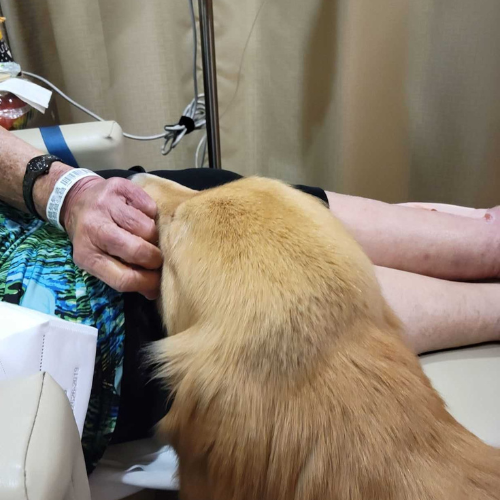Your Support Helps Simba Bring a Smile to Patients' Faces
 I am just the honored person who is holding the leash,” said animal therapist Noreen Boynton. “Five seconds after I leave, people probably won’t remember my name, but they will remember Simba — and then ask, ‘When is Simba coming back?’ Not, ‘When is Noreen coming back?’”
I am just the honored person who is holding the leash,” said animal therapist Noreen Boynton. “Five seconds after I leave, people probably won’t remember my name, but they will remember Simba — and then ask, ‘When is Simba coming back?’ Not, ‘When is Noreen coming back?’”
Simba, a handsome and well-behaved two-year-old Golden Retriever, had just finished visiting 38 people at Tallahassee Memorial HealthCare — patients and colleagues whose day was brightened by the visit. Three patients he saw were in the Intensive Care Unit.
“After a patient visit in ICU, a nurse stopped me and said, ‘that made a world of difference,’” Noreen said, adding that the nurse then took a few seconds to pet and interact with Simba.
“The decisions that these nurses make minute by minute are life-saving for the patient,” Noreen said. “When they take a precious, 10-second break for themselves, it means a lot. They may be thinking, ‘This will make me a better nurse — a better care giver.’”
Noreen said she recognized early on Simba would be an excellent therapy dog for patients. “He loves people — and that’s the heart of a therapy dog and the heart of Simba,” she said. “He is absolutely the kindest, softest soul.”
Noreen was randomly chosen from those who cast votes in April during National Therapy Animal Day to have her “favorite” pet featured in this newsletter. However, “favorite” may not be the correct word, as Noreen has six dogs that she lovingly cares for.
Although Noreen does not have an M.D., she is certainly Mad about Dogs, and on the sleeve of her white shirt, and that of every animal therapist, is embroidered, “DOGTORS — Animals Helping People.”
Thanks to you, the Animal Therapy program is able to screen and extensively train animals of all types, so they and their owners are well-prepared to visit not only patients, but people with stressful jobs in more than 70 community organizations outside of TMH.
“For example,” Noreen said, “Our teams visit the Central Dispatch Center — the 911 operators — certainly a stressful job. They aren’t part of TMH, but the hospital reaches out to say we can help.”
“Our donors are the lifeblood of the program — they make this possible,” said Stephanie Perkins, Director of the Animal Therapy program. “If they could only see the look on patients’ faces when they get a visit from one of our therapists, they would know that what they are supporting makes a huge difference in a person’s life.”
“TMH is a big healthcare system and it serves a large region,” Noreen added. “The need is so great, and even though we have well over 200 teams, it’s not nearly enough. We can always use more volunteers.”
If you would like to help the Animal Therapy program, visit TMH.ORG/DONATE and choose “Animal Therapy” from our dropdown menu. Every gift, no matter its size, helps.
